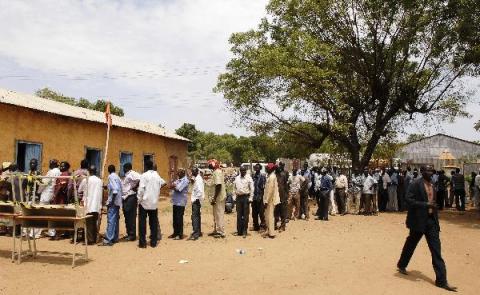Sudanese elections crucial in possible partition

The Sudanese elections taking place now could lead to partition of the country between north and south. Oil will be a key factor in the negotiations if hostility is to be avoided. By Justin Frewen.
Dialogue on Sudan in recent years has tended to focus on Darfur. While understandable given the violence that has happened there since 2003, this focus overshadows important developments in the south of the country.
Indeed, the future of the south holds the greatest long-term consequences for Sudan as a whole. Home to 80% of the country’s oil resources, South Sudan will vote in January 2011 on whether to remain as part of Sudan or to become an independent state.
(Picture: Sudanese people queue to cast their vote in the current elections)
Should the south opt for independence, Sudan will lose the majority of its resources and also provide a potential model for Darfurians to try and emulate.
This week saw the staging of the first national multi-party poll since 1986. Seen by many as an important stepping stone towards the 2011 referendum in Southern Sudan, these elections are being closely monitored by the international community.
The south of Sudan has been ravaged by conflict since 1956. It is estimated that 2 million Southern Sudanese lost their lives and that a further 4 million exiled. Peace returned only with the signing of the Comprehensive Peace Agreement (CPA) in 2005.
The 2005 CPA granted autonomy to Southern Sudan and allowed for the equal sharing of oil revenues between north and south.
The current elections, part of the CPA, are taking place against a backdrop of violence, which claimed some 2,500 lives in Southern Sudan over the past year, a total far greater than in Darfur.
In addition, a further 350,000 people were displaced while the number of people requiring food aid quadrupled from under 1 million in 2009 to 4.3 million in early 2010.
However, the major issue remains the feasibility of the 2011 referendum. Should the south vote for its independence, as is widely expected, will it be possible for the south to separate from Sudan in a peaceful and consensual manner?
The Sudanese President Omar al-Bashir, subject to an International Criminal Court warrant over alleged war crimes in Darfur, has stated that while he is against the south's secession, he will accept the result of the referendum.
Threats by the Sudan People's Liberation Movement (SPLM), however, the main party in the south, to boycott the elections has led to Bashir warning he might cancel the 2011 referendum.
While the head of the SPLM, Salva Kiir, who is also the vice-president of Sudan and president of Southern Sudan, has rejected Bashir's threats, there is no doubt the north could make it virtually impossible to implement such a referendum.
Moreover, they could also refuse to accept its results, which could well lead to a resumption of hostilities.
The elections have demonstrated the weakness of the agreement between Bashir's party, the National Congress Party (NCP), and Kiir's SPLM.
Emblematic of this was the nomination by the SPLM of Yasir Arman to challenge Bashir for the north's presidency, despite the NCP's announcement that they would not oppose Kiir's candidacy in the south.
Ironically, it was Arman's decision to withdraw from the presidential race, alleging fraudulent practices, that really set the cat among the pigeons.
A number of other opposition parties declared that they too would boycott the upcoming elections, thus placing their credibility in doubt.
However, the opposition is far from united and it would appear that despite serious opposition in certain regions, the NCP will almost certainly remain the dominant force in Sudan's politics.
The importance attached by all the concerned parties as to where control of the country’s important oil resources is hardly surprising. Oil played a significant role in the drawing up of the CPA.
At present, Sudan’s oil revenues are divided on a 50/50 basis between the north and the south. While questions have been raised as to the efficacy and transparency of this arrangement, it has worked reasonably well to date.
However, should Southern Sudan opt for independence in the 2011 Referendum, Northern Sudan risks seeing up to 80% of its oil wealth departing with the newly seceded South.
The potential loss of oil revenue is clearly a source of major concern for Bashir’s government.
Although both Bashir and Kiir have tried to alleviate public concerns on this issue, many in the south remain convinced that should Southern Sudan vote for independence, the Northern government will be pressured into taking action to protect their oil interests.
It was in response to such fears that Kiir, when delivering a speech to commemorate the 5th anniversary of the signing of the CPA, assured Northern Sudan, "Before appropriate oil infrastructure is developed in Southern Sudan, the oil produced in Southern Sudan will continue to flow from the south to north for processing and export."
It remains to be seen if such promises will be sufficient to reassure those in the north who might be in favour of more forceful action to ensure that control over the country’s oil resources remains within a united Sudan.
